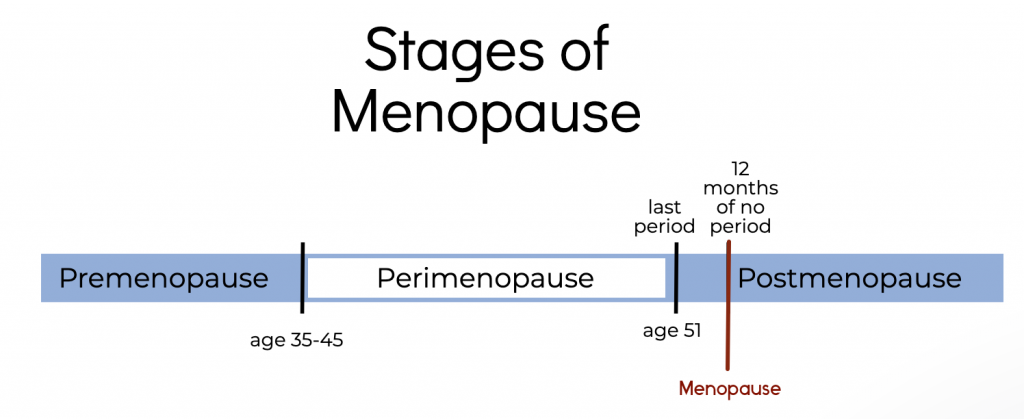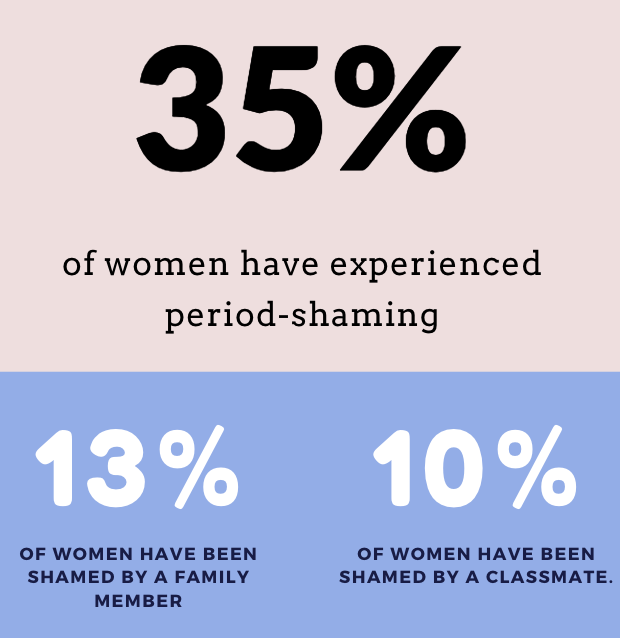People may not know what it is.
There is a lack of knowledge about menopause in general and even less about perimenopause. Many women have never heard of the word perimenopause (peri- is a prefix meaning “about”), and even medical residents are barely comfortable with the topic. Technically, menopause is a medical event happens a woman has no menstruation for 12 months, but the word is also sometimes used to describe the whole process of hormone changes in midlife.

Aging is for old people
People are living longer, and women live longer than men. You hear phrases like 40 is the new 30, and age is just a number, etc. The older people get the longer they think it takes a person to reach old age. Since the stereotype for menopause is old age, most women experiencing perimenopause (which can start as early as in the late 30s) are not expecting it.
Stigma around aging
Social researchers who have consistently found that racial and ethnic stereotypes are likely to give way over time and with contact, but not those about age. social researchers who have consistently found that racial and ethnic stereotypes are likely to give way over time and with contact, but not those about age. Age bias in the workplace is a pervasive problem in spite of the passing of Age Discrimination in Employment Act of 1967. Furthermore, women face age discrimination earlier and more often than men.
Stigma around mental health
According to the National Alliance on Mental Illness, mental health stigma is “when someone, or even you yourself, views a person in a negative way just because they have a mental health condition. Some people describe stigma as a feeling of shame or judgment from someone else. Stigma can even come from an internal place, confusing feeling bad with being bad.” Many risk factors for physical and mental health problems are beyond an individual’s control. The level of knowledge among the public regarding mental health problems is poor, and negative beliefs and attitudes are widespread. Misconceptions range from whether the person is responsible for their condition, how common it is, and that people can cure themselves by ‘pulling themselves together.’ Stigma can lead a person to avoid seeking help for their mental health problem due to embarrassment or fear of being shunned or rejected.
Stigma around menstruation

Menstruation taboo not only is extremely prevalent in many cultures but also can affect many areas of people’s lives. Girls are taught at a young age to be private and discreet when it comes to their period. There is a significant lack of health education resources available to people about the menstrual cycle. It is this lack of knowledge that fuels myths which ostracize and humiliate women during their monthly periods. Menstruation is one of the most natural functions in the world. It is a mark of femininity and fertility, and a considerable part of life for most women. Yet, women are frequently made to feel ashamed or embarrassed just because they bleed. According to research by THINX, this shaming often comes from those closest to them.
Loss of Control
During regular reproductive years, women get used to their hormonal rhythm and flows. When perimenopause hits, estrogen level starts its descent and the rhythm and flows become disrupted. Many perimenopausal women also report having memory issues, which can be frightening and make women worry about early symptoms of Alzheimer’s disease. Many symptoms associated with menopause – hot flashes, an increase in anxiety – are totally normal. However, when the experience of perimenopause and menopause is not well-understood and often derided, these symptoms can create not only the self-perception that she is out of control. At work, others may see her behavior as a performance issue, and such perception can result in being given less responsibility, and even in job loss.
Change is Not Fun
When you look at the potential effects of menopause and societal pressures, this period of life can sound overwhelming. Midlife is loaded with stressors – a mix of challenges between children, financial, career, getting older in a society that values youth, changes in romantic relationships, and caring for aging parents or worrying about a partner’s health. Doctors who are not well-versed with menopause may dismiss a woman’s complaints as just stress, which can even add more internalized suffering for the woman.
Stigma lives in ignorance and perpetuates suffering. Do not equate yourself with your problems or let stigma create self-doubt and shame. Join our Perimenopositive group and choose empowerment over shame.